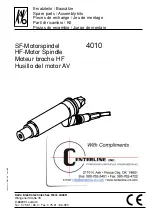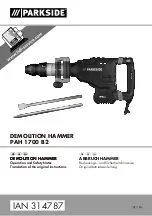
8 - English
OPERATION
TOO SLOW FEEDING
See Figure 9, page 12.
When the router is advanced into the work too slowly, the
revolving bit does not dig into new wood fast enough to
take a bite; instead, it scrapes away sawdust-like particles.
Scraping produces heat, which can glaze, burn, or mar the
cut, and can overheat the bit. Dull bits can also contribute
to scraping and burning.
It is more difficult to control a router when the bit is scraping
instead of cutting. With practically no load on the motor, the
bit will be revolving near top RPM, and will have a greater
than normal tendency to bounce off the sides of the cut,
especially if the wood has a pronounced grain with hard
and soft areas. The cut that results may have rippled sides
instead of straight.
FORCE FEEDING
See Figure 9, page 12.
The router is an extremely high-speed tool (17,000-
25,000 r/min.), and will make clean, smooth cuts if allowed
to run freely without the overload of a forced feed. Three
things that cause force feeding are bit size, depth of cut,
and workpiece characteristics. The larger the bit or the
deeper the cut, the more slowly the router should be moved
forward. If the wood is very hard, knotty, gummy or damp,
the operation must be slowed still more.
Clean, smooth laminate trimming and edge shaping can be
done only when the bit is revolving at a relatively high speed
and is taking very small bites to produce tiny, cleanly-severed
chips. If the router is forced to move forward too fast, the
speed of the bit becomes slower than normal in relation to
its forward movement. As a result, the bit must take bigger
bites as it revolves. Bigger bites mean bigger chips and a
rougher finish. Bigger chips also require more power, which
could result in overloading the motor.
Under extreme force-feeding conditions, the relative speed
of the bit can become so slow—and the bites it has to take
so large—that chips will be partially knocked off rather than
fully cut off. This will result in splintering and gouging of the
workpiece.
DEPTH OF CUT
See Figure 10, page 12.
Depth of cut affects the rate of feed and the quality of a cut.
Using the proper depth of cut can lessen the possibility of
damage to the router motor and bit.
A deeper cut requires a slower feed than a shallow one.
Making a cut that is too deep will slow the feed so that the
bit is scraping, rather than cutting, and is not recommended.
A too-deep cut can cause smaller bits to be broken off.
Bits that are 1/16 in. in diameter are easily broken off when
subjected to too much side thrust. A larger bit is not as likely
to break, but attempting a cut that is too deep may result in
a rough cut, and may make it difficult to guide and control
the bit as desired.
It is recommended that you do not exceed 1/8 in. depth of
cut in a single pass, regardless of the bit size or the softness
or condition of the workpiece. This will result in a higher
quality cut.
To make deeper cuts, it is necessary to make as many suc-
cessive passes as required, lowering the bit 1/8 in. for each
new pass. To save time, perform all the cutting necessary at
one depth setting, then lower the bit for the next pass. This
will assure uniform depth when the final pass is completed.
WARNING:
If the desired depth of cut is greater than can be
safely cut in one pass, make cuts in two or more
passes. Do not remove more than 1/8 in. in a single
pass. Excessive depth of cut can result in loss
of control and the possibility of serious personal
injury.
SETTING DEPTH OF CUT
See Figure 11, page 13.
Remove the battery pack.
Pull the quick release lever to the open position to free
the motor housing in the base.
Depress and hold the motor release lever.
NOTE:
Large depth of cut adjustments can be made
using the motor release lever and positioning the motor
housing by moving it in the base by hand.
With the desired bit installed into the collet and tightened
securely, slide the motor housing section of the router
upward in the base until the tip of the bit is just above
the work surface (bottom surface of subbase) by 1/4 in.
minimum. Release the motor release lever once the bit
is positioned above the work surface.
Turn the micro depth adjustment knob slowly clockwise to
lower the bit slowly towards the work surface. The depth
of cut is considered “zero” when the bit just touches the
work surface.
NOTE:
To set the zero reset function to zero while the bit
is at zero depth, hold the micro depth adjustment knob in
place and rotate the zero reset function ring until it reads
“0”.
NOTE:
One full revolution of the micro depth adjust knob
moves the router housing 1/16 in.
Remove the router from the work surface.
Using the micro depth adjustment knob, adjust the
position of the bit to obtain the desired depth of cut. To
move the bit down, turn the micro depth adjustment knob
toward the down indicator arrow to the side of the knob.
Always observe the 1/8 in. MAX depth of cut per pass
rule when cutting.









































